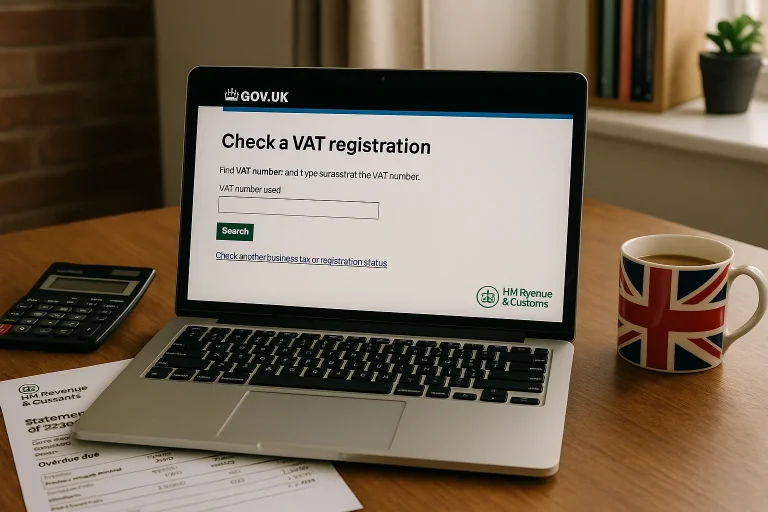Purchasing property through a limited company is an increasingly popular approach among landlords and investors in the UK. It offers a range of tax advantages, asset protection, and portfolio flexibility.
However, it also involves a more complex legal and financial structure than buying property as an individual.
This blog explores the key considerations, tax implications, pros, and cons of buying property through a limited company to help you decide whether it’s the right move for your investment goals.
What Does Buying Property Through a Limited Company Mean?

When you purchase a property through a limited company, the business becomes the legal owner of the asset rather than you as an individual.
This structure is often used by investors and landlords who aim to build or manage a property portfolio in a more tax-efficient and financially structured way.
A limited company is a separate legal entity, which means it is responsible for its own debts and liabilities.
This offers a layer of protection for the personal assets of the company’s directors and shareholders.
The process typically involves setting up a Special Purpose Vehicle (SPV), a type of limited company specifically created for property investment.
This structure is commonly used by lenders and simplifies accounting and taxation processes.
While personal ownership is simpler, limited company ownership introduces several considerations, including corporate tax treatment, mortgage accessibility, and administration responsibilities.
Why Do Landlords Choose to Buy Property Through a Limited Company?
Many landlords, particularly those who are higher-rate taxpayers or planning to build larger portfolios, choose this route for specific advantages.
The main reason is tax efficiency. Rental profits generated by the property are subject to Corporation Tax, which ranges from 19% to 25% depending on annual profits. This is usually lower than the 40% or 45% Income Tax rates that higher or additional-rate taxpayers face when owning property personally.
Section 24 of the Finance Act 2015 further reduced the attractiveness of personal ownership by removing full mortgage interest relief for individual landlords.
Under the current rules, individuals only receive a basic rate tax credit for mortgage interest, while limited companies can still deduct the full amount from rental income before tax.
There are also long-term planning benefits. Profits can be retained in the company to reinvest in future property purchases, reducing the need for personal withdrawals.
Additionally, ownership through a company provides greater flexibility in estate planning and potential Inheritance Tax relief under Business Relief, which can lower the amount of tax owed by heirs.
What Are the Main Tax Advantages of Buying Property Through a Limited Company?

When assessing whether to buy property through a limited company, taxation is one of the most critical considerations. The structure can provide multiple layers of tax efficiency for property investors, particularly for those in higher income brackets. Understanding each tax component is vital to evaluating its overall financial benefit.
Corporation Tax on Profits
Rental income generated through a company is taxed under Corporation Tax rather than personal Income Tax. The Corporation Tax rate currently ranges between 19% and 25%, depending on annual profits.
This is considerably lower than the 40% or 45% Income Tax that higher-rate and additional-rate taxpayers may pay on personally held rental income.
For example, a landlord earning £40,000 annually from rent could save thousands each year by paying Corporation Tax rather than personal Income Tax.
Deductibility of Mortgage Interest
Since the introduction of Section 24 under the Finance Act 2015, individual landlords can no longer fully deduct mortgage interest costs from their taxable rental income.
They only receive a 20% tax credit for mortgage interest payments, which reduces the relief available to higher-rate taxpayers.
Limited companies are exempt from this restriction. They can fully deduct mortgage interest and other finance-related expenses from rental income before calculating Corporation Tax. This significantly improves net profitability, especially for landlords with highly leveraged portfolios.
Retaining and Reinvesting Profits
Profits made through a limited company can be retained within the business instead of being withdrawn as income. Retaining profits allows investors to reinvest in additional properties or renovations without triggering personal tax liabilities.
This structure supports long-term portfolio growth and helps avoid unnecessary personal tax exposure. When funds are eventually withdrawn, they can be taken as dividends, which are taxed separately and often at lower rates than income.
Tax Efficiency on Property Sales
When a company sells a property, the profit made is subject to Corporation Tax rather than Capital Gains Tax (CGT). Companies do not benefit from a CGT allowance, but they pay a lower effective rate compared to the 18% or 24% CGT rates for individuals.
This can be particularly advantageous for investors selling high-value properties or portfolios, as the corporate rate often results in lower overall tax due.
Estate and Inheritance Tax Planning
Owning property through a company can facilitate tax-efficient estate planning. Company shares, rather than the physical properties themselves, can be passed on to beneficiaries.
In some cases, Business Relief may apply, reducing the Inheritance Tax (IHT) payable on the company’s assets. This is particularly useful for family-run property businesses or investors aiming to build generational wealth.
Tax Overview:
| Tax Aspect | Individual Ownership | Limited Company Ownership |
|---|---|---|
| Tax on Rental Income | 20%–45% Income Tax | 19%–25% Corporation Tax |
| Mortgage Interest Relief | Restricted to 20% credit | Fully deductible |
| Capital Gains on Sale | 18%–24% (after £3,000 allowance) | Corporation Tax on full gain, no allowance |
| Profit Retention | Not applicable | Profits can be retained for reinvestment |
| Inheritance Tax Relief | 40% over £325,000 threshold | Potential Business Relief may apply |
Strategic Advantage for Portfolio Landlords
For landlords planning to scale their property holdings, using a limited company creates a flexible and tax-efficient framework. Profits can be recycled into new purchases, expenses are easier to manage, and the corporate tax system allows for more predictable long-term planning.
While the benefits are most significant for higher-rate taxpayers, even basic-rate taxpayers planning to grow substantial portfolios may find this structure advantageous in the long run.
What Are the Disadvantages or Risks in Purchasing Property via a Limited Company?

Although the limited company structure provides tax and liability benefits, it also introduces complexities and potential drawbacks that must be carefully considered.
These disadvantages may outweigh the benefits for smaller-scale investors or those looking for simplicity in property ownership.
Higher Mortgage Interest Rates and Deposits
Mortgages obtained through limited companies typically come with higher interest rates and larger deposit requirements compared to personal buy-to-let mortgages.
Lenders view limited companies as higher-risk borrowers because they are separate legal entities. This can result in fewer available mortgage products and stricter lending criteria.
Most limited company mortgages require a minimum 25% to 40% deposit, and many lenders insist on personal guarantees from company directors. These guarantees mean that if the company defaults, the directors become personally liable for the debt.
Increased Administrative and Accounting Workload
Running a property business through a limited company involves additional legal, accounting, and administrative responsibilities.
Company directors must:
- File annual accounts and a confirmation statement with Companies House
- Submit Corporation Tax returns to HMRC each financial year
- Maintain proper financial records for all income and expenses
- Register for PAYE if taking a salary
- Handle dividend distributions and related tax filings
These administrative requirements can add considerable time and cost, especially for smaller landlords. Hiring an accountant is almost essential, adding further ongoing expenses.
No Capital Gains Tax Allowance
Unlike individuals, companies are not entitled to the annual Capital Gains Tax allowance. This means that when the company sells a property, it pays Corporation Tax on the entire profit, without any tax-free threshold.
While the Corporation Tax rate may be lower, the absence of an allowance can result in higher effective tax for smaller gains. This disadvantage is especially relevant for investors who frequently buy and sell properties.
Stamp Duty Land Tax (SDLT) Surcharge
Limited companies must pay an additional 3% Stamp Duty Land Tax surcharge on top of the standard SDLT rates for all residential property purchases exceeding £40,000.
In England and Northern Ireland, this surcharge applies regardless of whether the company already owns other properties. For properties valued above £500,000, a flat 17% SDLT rate can apply in specific cases.
These added costs can significantly affect the initial return on investment and should be included in all financial projections.
Complexity of Extracting Profits
Although limited companies offer flexibility in retaining earnings, withdrawing profits for personal use is not straightforward. Directors can take income as salaries or dividends, both of which attract tax.
Dividends are taxed at 8.75%, 33.75%, or 39.35%, depending on the shareholder’s personal tax band. If a director takes a salary, it is subject to both Income Tax and National Insurance contributions. This makes efficient financial planning essential to avoid double taxation.
Reduced Lender Choice
The number of mortgage lenders offering products for limited companies is smaller than the market for personal buy-to-let loans. As a result, competition is lower and interest rates are often higher.
Limited company mortgage products also tend to have stricter eligibility criteria, with fewer options for flexible repayment terms. This limitation can make refinancing or expanding a property portfolio more difficult.
Personal Guarantees and Limited Liability
While limited companies theoretically provide limited liability protection, in practice, most lenders require personal guarantees from directors.
This effectively removes the liability shield, as directors become personally responsible for repaying the company’s debts if it defaults.
Therefore, while the limited company structure can protect investors from certain operational risks, it does not eliminate financial liability in most mortgage agreements.
Summary of Key Disadvantages:
| Disadvantage | Impact on Investors |
|---|---|
| Higher mortgage rates and deposits | Increased financing costs |
| Additional SDLT surcharge | Higher upfront purchase expenses |
| No Capital Gains Tax allowance | Full profit subject to Corporation Tax |
| Complex administration requirements | More time and professional fees |
| Fewer mortgage lenders | Limited borrowing options and flexibility |
| Personal guarantees | Potential loss of limited liability protection |
These disadvantages mean that buying property through a limited company is not a one-size-fits-all solution. It suits long-term investors with multiple properties, but those with smaller portfolios or single properties may find direct ownership more cost-effective.
What Are the Costs Involved in Buying a Property Through a Limited Company?
Buying property through a limited company involves more upfront and ongoing costs than personal ownership. These costs should be factored into your financial analysis before deciding which structure is best.
Common costs include:
- Stamp Duty Land Tax surcharge of 3% to 5%
- Legal fees for setting up the company and completing the property transaction
- Mortgage arrangement fees, often higher than standard buy-to-let products
- Accountant fees for preparing financial statements, tax returns, and company filings
The table below summarises the types of costs you may encounter:
| Cost Category | Description |
|---|---|
| SDLT | Additional 3% surcharge for all properties over £40,000 |
| Mortgage | Higher interest rates and larger deposit requirements |
| Accounting | Annual Corporation Tax return, accounts, PAYE, and Self Assessment |
| Legal | Company formation, conveyancing, and compliance documents |
| Administration | Ongoing record-keeping and statutory reporting |
While some of these costs are deductible for Corporation Tax purposes, they still represent cash outflows that reduce your immediate profitability.
How Does Mortgage Lending Work for Limited Companies?

Securing a mortgage through a limited company is a different process than personal borrowing. The number of lenders offering these products is smaller, and they apply more rigorous criteria when evaluating applications.
Most lenders will require the company to be set up as a Special Purpose Vehicle (SPV) with an appropriate SIC (Standard Industrial Classification) code, such as 68100 for buying and selling real estate.
Lenders typically assess both the financial health of the company and the director’s personal financial background. Even though the company is the legal borrower, directors often must provide a personal guarantee. This means that if the company defaults on the mortgage, the lender can pursue the director for repayment.
Some typical requirements for a limited company mortgage include:
- Higher deposits, usually 25% to 40%
- Higher interest rates than personal buy-to-let mortgages
- Detailed documentation on the company’s structure and income
- Personal guarantee from the director(s)
Due to these restrictions, it is advisable to work with mortgage brokers who specialise in limited company buy-to-let products to access the best rates and terms.
Should You Transfer an Existing Property to a Limited Company?
For landlords who already own property personally, transferring it to a limited company might seem like a logical next step. However, this process is treated as a sale and purchase by HMRC and can result in significant tax liabilities.
The company must “buy” the property from you, triggering both Stamp Duty Land Tax and Capital Gains Tax. These taxes are calculated as if the property were sold at market value, even if no money actually changes hands.
This means you could face:
- Capital Gains Tax on the profit made since purchase
- SDLT, including the 3% surcharge, based on the full property value
- Legal and mortgage arrangement fees if refinancing is required
In most cases, it is not tax-efficient to transfer a property unless the long-term benefits of company ownership outweigh the immediate tax hit. However, new purchases made directly through a company avoid these complications.
What Are the Legal and Administrative Steps to Set Up a Property Investment Company?
Establishing a limited company for property investment in the UK involves several administrative steps. Most investors choose to set up an SPV, which is a type of company formed solely to own and manage property.
The basic process includes:
- Registering the company with Companies House
- Choosing the appropriate SIC code (commonly 68100, 68209, or 68320)
- Appointing directors and allocating shares
- Setting up a business bank account
- Registering for Corporation Tax with HMRC
Once operational, you will need to maintain statutory records, prepare and file annual accounts, submit a Corporation Tax return, and comply with director obligations.
While these requirements are manageable, they do require consistent attention. Engaging an accountant with experience in property investment companies is highly recommended.
Who Should Consider Buying Property Through a Limited Company?

The suitability of buying property through a limited company depends on your tax position, investment goals, and the scale of your property activities.
This approach is typically best suited to:
- Higher-rate or additional-rate taxpayers looking to reduce tax liability
- Investors planning to build a portfolio of rental properties
- Individuals seeking to reinvest profits within the business
- Those aiming to pass on property assets in a tax-efficient manner
- Partnerships or families wanting to own property jointly via company shares
For basic-rate taxpayers or those purchasing a single buy-to-let property, the additional costs and complexity may not be justified. However, for professional landlords and long-term investors, a limited company can offer significant advantages over time.
Conclusion
Buying property through a limited company offers a mix of benefits and complexities. For landlords and investors in higher tax brackets, the ability to claim mortgage interest and pay lower Corporation Tax can significantly boost profits.
However, the structure is not always ideal for basic-rate taxpayers or those with just one property. Additional administration, higher mortgage costs, and SDLT surcharges should all be weighed carefully.
Ultimately, the right approach depends on your personal financial position, investment goals, and how you plan to manage or grow your property assets over time. Professional advice is strongly recommended to ensure the structure supports your objectives.
FAQs About Buying Property Through a Limited Company
Can I live in a property owned by my limited company?
Typically, no. If you occupy a property owned by your company, it may trigger a Benefit in Kind and result in personal tax liability.
Is it cheaper to buy investment property through a company?
Not always. While Corporation Tax can be lower than personal Income Tax, extra costs such as SDLT, accounting, and mortgage interest can reduce or eliminate those savings.
Can I use personal savings to fund a company property purchase?
Yes, personal funds can be loaned to the company, which can repay you over time. However, there are tax considerations in how this is structured.
Do limited companies pay Capital Gains Tax?
No, they pay Corporation Tax on gains, which can be more or less favourable depending on the situation.
Can I transfer personal property to my company without paying tax?
Generally, no. The transaction is treated as a sale, so Stamp Duty and CGT usually apply.
Do I need a business account for property in a limited company?
Yes, opening a dedicated business bank account is necessary for managing rental income and expenses through the company.
How are dividends taxed when taking profits from a property company?
Dividends are subject to personal Dividend Tax at rates ranging from 8.75% to 39.35%, depending on your income level.
{
“@context”: “http://schema.org/”,
“@type”: “FAQPage”,
“mainEntity”: [
{
“@type”: “Question”,
“name”: “Can I live in a property owned by my limited company?”,
“acceptedAnswer”: {
“@type”: “Answer”,
“text”: “Typically, no. If you occupy a property owned by your company, it may trigger a Benefit in Kind and result in personal tax liability.”
}
},
{
“@type”: “Question”,
“name”: “Is it cheaper to buy investment property through a company?”,
“acceptedAnswer”: {
“@type”: “Answer”,
“text”: “Not always. While Corporation Tax can be lower than personal Income Tax, extra costs such as SDLT, accounting, and mortgage interest can reduce or eliminate those savings.”
}
},
{
“@type”: “Question”,
“name”: “Can I use personal savings to fuYes, personal funds can be loaned to the company, which can repay you over time. However, there are tax considerations in how this is structured.nd a company property purchase?”,
“acceptedAnswer”: {
“@type”: “Answer”,
“text”: “Yes, personal funds can be loaned to the company, which can repay you over time. However, there are tax considerations in how this is structured.”
}
},
{
“@type”: “Question”,
“name”: “Do limited companies pay Capital Gains Tax?”,
“acceptedAnswer”: {
“@type”: “Answer”,
“text”: “No, they pay Corporation Tax on gains, which can be more or less favourable depending on the situation.”
}
},
{
“@type”: “Question”,
“name”: “Can I transfer personal property to my company without paying tax?”,
“acceptedAnswer”: {
“@type”: “Answer”,
“text”: “Generally, no. The transaction is treated as a sale, so Stamp Duty and CGT usually apply.”
}
},
{
“@type”: “Question”,
“name”: “Do I need a business account for property in a limited company?”,
“acceptedAnswer”: {
“@type”: “Answer”,
“text”: “Yes, opening a dedicated business bank account is necessary for managing rental income and expenses through the company.”
}
},
{
“@type”: “Question”,
“name”: “How are dividends taxed when taking profits from a property company?”,
“acceptedAnswer”: {
“@type”: “Answer”,
“text”: “Dividends are subject to personal Dividend Tax at rates ranging from 8.75% to 39.35%, depending on your income level.”
}
}
]
}







